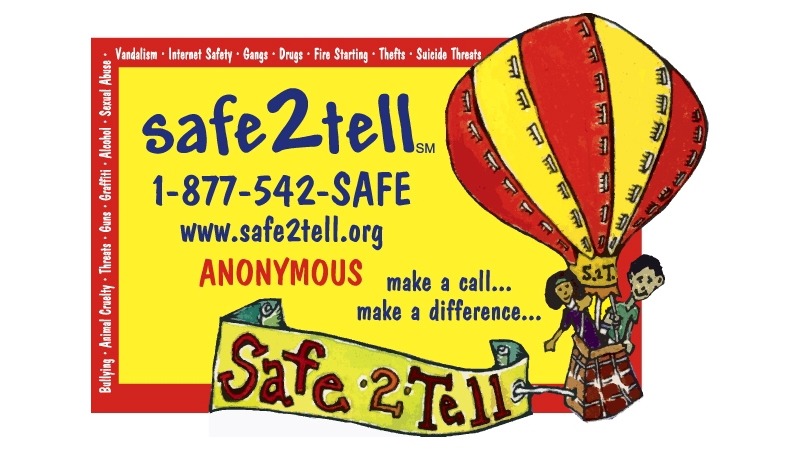Safe2Tell: Breaking the Code of Silence

Make a report. Make a difference. Anonymously report anything that concerns or threatens you, your friends, your family or your community 24/7, 365 days. 1-877-542-SAFE. www.safe2tell.org
A note passed between two 15-year-olds in a rural Colorado classroom set in motion a chain of events last spring that resulted in moving several young girls and a 20-month-old baby out of harm’s way. Alarmed by what she read, one of the students shared the note with the baby’s grandmother who subsequently made an anonymous call to Safe2Tell.
This information exchange is just one example of more than 8,000 calls received to date since Safe2Tell’s inception in September 2004. Resulting in more than 2,565 “tips” from 158 Colorado cities and 56 counties, these calls have alerted local law enforcement and school officials to hundreds of threats or incidents involving everything from bullying and fights to domestic violence, substance abuse and suicide prevention.
By making just one phone call, the caller was able to activate a rapid response and intervention. “It was like a blanket effect,” she said. “I called Safe2Tell at 7:30 a.m. and the deputy sheriff was at my door before 10:00 a.m. The report had been written and the school administration and local police had already been notified. The efficiency was startling.” Plus, she added, the perpetrators now know they are being watched—hopefully a deterrent to future bad behavior.
In response to recommendations from the Columbine Commission in the wake of the tragic school shootings, The Colorado Trust funded the startup and development of Safe2Tell over a six-year period (2003 to 2009). The Commission found that a student culture that reinforces a “code of silence” and fear of retaliation inhibit young people from reporting threats and unusual behavior. Yet, research shows that in 81 percent of violent incidents on U.S. school campuses, the attacker had told someone about their plans.
Safe2Tell provides a safe, anonymous alternative to teens, young adults, parents and school employees who might feel uncomfortable calling the police or sheriff but want to get information to the appropriate authorities before the violence starts. And it has led to inquiries from two dozen other states wanting to replicate it.
“We were surprised by the extent to which the Safe2Tell line would be used. And that kids are so connected,” says Susan Payne, Safe2Tell founder and Executive Director. “They text. They have Facebook and MySpace. They know before anyone else if someone’s contemplating suicide or is having a difficult time after a breakup or is cyber bullying or making threats.”
“Once they get to middle and high school, kids are trying on their independence,” says Don Quick, District Attorney for Adams and Broomfield Counties and Columbine Commission member. “They want to claim ownership for their schools. They can be our partners in making our schools and communities safer. What we need to do is give them tools to make that a reality.”
With a call center staffed 24/7 by trained professionals at the Colorado State Patrol’s office and anonymity guaranteed by state law and protocols established by the program, Safe2Tell provides those tools. Information is immediately forwarded to local school and law enforcement authorities for investigation, and, if warranted, intervention. Additionally, Safe2Tell follows up with the school that received the report to ensure that it was investigated and appropriate action taken.
By all accounts, the kids using the reporting tool are the cornerstone of Safe2Tell’s effectiveness. Behind them is an extensive network of state and local, public and private partnerships that sustain it. Safe2Tell has proven to be a winning community engagement strategy that brings together students, school administrators and staff, law enforcement officials, and health and human services agencies to prevent violence and promote safety on school campuses and in communities across Colorado.
“We’ve accomplished so much on a shoestring budget because people see it as a good solution,” says Payne. “Safe2Tell engages and empowers the youth to be part of that solution.”
On Sept. 7, 2010, at Aurora’s Regis Jesuit High School, Safe2Tell will launch its latest community-driven initiative: Conversation Jumpstarters, a series of 12 video modules, produced in the popular “graphic novel” format that will be used by teachers in classrooms, counselors and resources officers to explain Safe2Tell to students—how it works and why it is used by a growing number of young adults across the state. “The point is to get the kids talking about the issues on their minds, their fears and what solutions exist,” says Susan Payne.
Conversation Jumpstarters is the outcome of a collaborative effort among students, The Children’s Hospital, physicians, psychiatrists, psychologists, school nurses and community relations specialists who have provided input and feedback to ensure the messages carried in the videos are those that kids encounter on a daily basis.”

